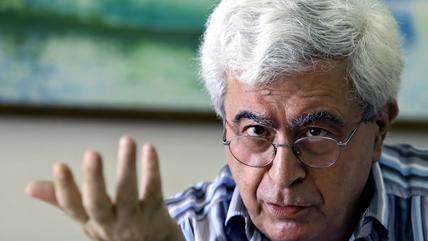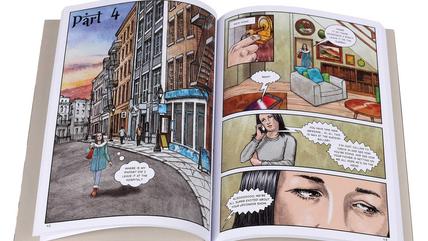Most recent articles by Nahrain al-Mousawi
-
 In memory of Elias Khoury
In memory of Elias Khoury"Forgetting is a blessing"
A look back at the life, work and enduring political relevance of Lebanese writer, intellectual, and giant of modern Arabic literature Elias Khoury, who passed away on 15 September.
-
 Pete Katz and "The Prophet: A Graphic Novel"
Pete Katz and "The Prophet: A Graphic Novel"Romantic ideals for a new generation
Often disdained by intellectuals, Kahlil Gibran’s "The Prophet" has remained immensely popular for nearly a century since its publication in 1923. Now one of the most translated books in history has undergone another translation – into the visual sphere – by Pete Katz, who both adapted and illustrated the new volume. By Nahrain Al-Mousawi
-
 Non-fiction: ″Syrian Notebooks: Inside the Homs Uprising″ by Jonathan Littell
Non-fiction: ″Syrian Notebooks: Inside the Homs Uprising″ by Jonathan LittellTranscribing the horror
Back in 2012 Jonathan Littell spent two weeks working as a ″Le Monde″ journalist in the Syrian city of Homs, the focus of resistance to Bashar Al-Assad′s regime. His diary from the period is a graphic account, urgently conveyed as events unfold at breakneck speed. Nahrain Al-Mousawi read the book
-
 Book review: ″Vanished″ by Ahmed Masoud
Book review: ″Vanished″ by Ahmed MasoudThe youngest detective
Ahmed Masoud′s debut novel is a nuanced chronicle of one of the world′s most troubled regions. Reflecting the way children are forced to grow up before their time in the beleaguered Gaza Strip, this whodunnit centres on a child detective. Nahrain Al-Mousawi read the book
-
 Book review: ″Telepathy″ by Amir Tag Elsir
Book review: ″Telepathy″ by Amir Tag ElsirAn author and his doubles
Published in English translation in June 2015, ″Telepathy″ is an exercise in alienation characterised by metafictional themes and double identities. Yet does the collapse of reality live up to its promise? Nahrain al-Mousawi read the book
-
 Book review: ″The Broken Mirrors: Sinalcol″ by Elias Khoury
Book review: ″The Broken Mirrors: Sinalcol″ by Elias KhouryA dizzying sense of displacement
Originally published in Arabic in 2012, ″The Broken Mirrors: Sinalcol″ was only translated into English this year. It contains many of the tropes that Elias Khoury readers will find familiar: shifting perspectives, an unreliable narrator, obscured memories, uncertain truths, and reflections upon narration. Nahrain al-Mousawi has read the book
-
 Moroccan writer Abdellah Taia
Moroccan writer Abdellah TaiaDisenchantment and a hint of nostalgia
The openly homosexual writer and film-maker, Abdellah Taia, on his latest novel, the painful process of coming out and whether he will ever move back to Morocco. A portrait by Nahrain Al-Mousawi
-
 Book review: "The Bamboo Stalk" by Saud Alsanousi
Book review: "The Bamboo Stalk" by Saud AlsanousiA life uprooted and replanted
The world is familiar with reports about the exploitation of migrant labourers in the Gulf region. In 2013, Saud Alsanousi's book "The Bamboo Stalk", which focuses on the experiences of a young man in Kuwait who is half Kuwaiti, half Filipino, won the International Prize for Arabic Fiction. This novel shines a light on the discrimination and rejection experienced by so many migrants in this region. Nahrain Al-Mousawi read the book
-
 Book review: "Where Pigeons Don't Fly" by Yousef Al-Mohaimeed
Book review: "Where Pigeons Don't Fly" by Yousef Al-MohaimeedHaunted by a suffocating society
Yousef Al-Mohaimeed's "Where Pigeons Don't Fly" begins with the melancholic self-imposed exile of a young Saudi man in a small UK town. Originally published in 2009 in Arabic, the novel became a bestseller and was translated to English by Robin Moger last year. While Al-Mohaimeed's short stories and novels are mostly set in Saudi Arabia, have garnered acclaim and prizes, and been translated into several languages, this controversial author's work has had to be published outside the kingdom due to censorship. By Nahrain Al-Mousawi
-
 Book review: "What Makes a Man? Sex Talk in Beirut and Berlin"
Book review: "What Makes a Man? Sex Talk in Beirut and Berlin"An honest and painful cultural exchange
In 2003, two authors – one from Germany, one from Lebanon – spent time in each other's company and countries as part of a cultural exchange programme. Twelve years on, a book resulting from this encounter has been published: one section of the book details the Lebanese author's reaction to meeting a homosexual; another is devoted to the German author's rebuttal of this account. According to Nahrain Al-Mousawi, it is an unsettling read on many levels